A decade of hate: How South Dakota's anti-LGBTQ+ bills have grown in the last 10 years
Editor’s note: This is the first article in a series of six exploring South Dakota’s last decade of anti-LGBTQ+ legislation, “A decade of hate.”
Stay with the Argus Leader in the coming days for the second, third, fourth, fifth and sixth articles in this series.
This story also mentions suicide. The National Suicide Prevention Lifeline is a hotline for those in crisis. To speak with a certified listener, call 988. The Trevor Project is also the world’s largest suicide prevention and crisis intervention organization for LGBTQ+ youth. For help, call 1-866-488-7386.
Forty-two pieces of legislation affecting the LGBTQ+ community have been proposed since 2014 in South Dakota.
An Argus Leader review of the last 10 legislative sessions shows 36 of those 42 bills were focused on attempting to bar LGBTQ+ people from adopting children, from playing on the sports teams that match their gender, from seeking gender-affirming care at a young age, and more.
The bills have accounted for nearly a decade of dangerous anti-LGBTQ+ rhetoric in South Dakota, seen everywhere from the Legislature to the local level, members of the LGBTQ+ community said.
A decade of hate.
“At the core since I’ve been here, that animus toward LGBTQ+ and Two Spirit people has always been present in the legislative landscape in South Dakota,” said Libby Skarin, campaigns director for the ACLU of South Dakota, North Dakota and Wyoming, crediting South Dakota with being one of the earliest states to start pushing anti-trans legislation.
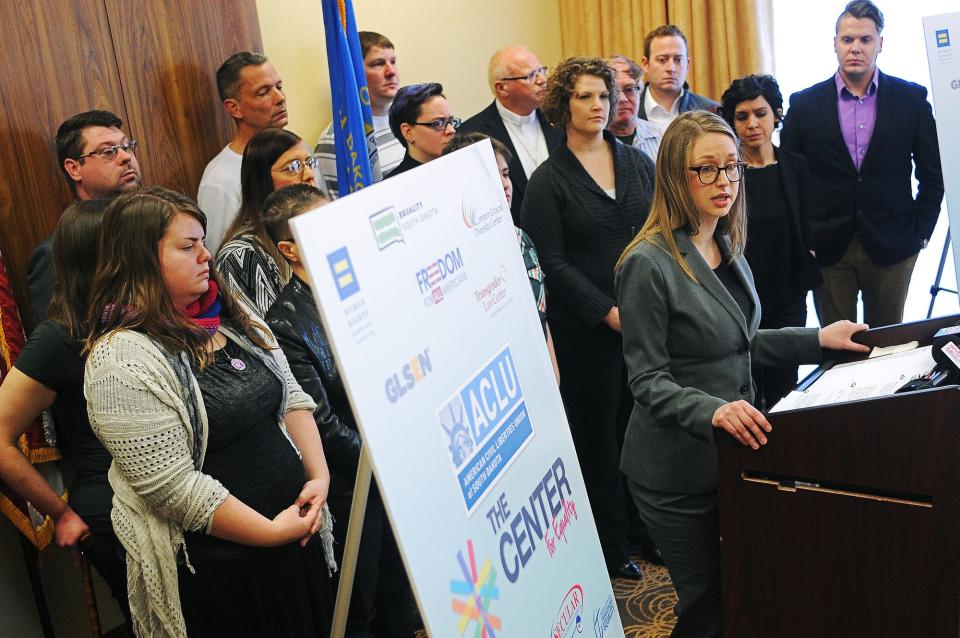
Opponents of these bills have said in legislative hearings, and in interviews with the Argus Leader, the bills are causing people in the LGBTQ+ and Two Spirit community to leave the state, increasing rhetoric that harms the community, affecting access to basic things like healthcare, and driving up negative mental health outcomes.
Nearly one-third of LGBTQ+ young people in the U.S. said their mental health was poor most of the time or always due to anti-LGBTQ+ policies and bills, according to The Trevor Project’s 2023 national survey.
Some of these bills have come from a multi-state campaign led by legislators and lobbyists across the U.S. and have placed South Dakota on par with several other states that have similar policies detrimental to the LGBTQ+ community.
One of the bills from that campaign — 2023’s House Bill 1080 — culminated that decade of marginalization this month after it went into effect July 1, ending transgender youths’ ability to seek medical care that best affirms their gender and forcing trans youth to stop their medical transition until they’re 18.
The bill passed this year after similar efforts failed in 2019, 2020 and 2021.
“We’re really proud as South Dakotans to be self-determinant and have self-control over our lives,” said Rep. Kameron Nelson (D-Sioux Falls), the first openly gay man elected to the South Dakota Legislature. “We don’t like when people tell us what to do, especially the government. So, it’s a moment of irony when folks climb to the mountaintop and scream freedom and liberty, but in the same breath, take human rights away from people.”
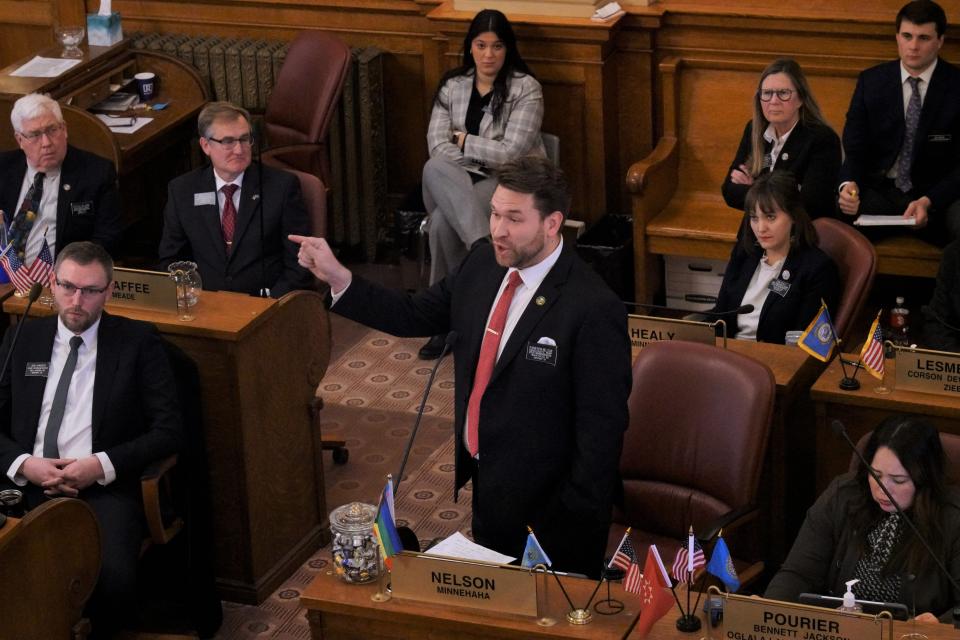
What has this legislation looked like over the last decade?
South Dakota lawmakers’ targeting of, and focus on, the LGBTQ+ community has changed over the course of the decade.
The first anti-LGBTQ+ bills in the state aimed to protect religious groups, clergy or businesses that didn’t want to provide services for gay marriages, didn’t want to hire anyone from the LGBTQ+ community, or wanted to express their negative views of the LGBTQ+ community more openly.
Those sprung up in 2014 and again in 2016 and 2017, including one bill (Senate Bill 149 in 2017) that allowed faith-based or religious adoption agencies to discriminate on adopters of various identities, including being LGBTQ+. That bill was signed into law by then-Gov. Dennis Daugaard because he thought it would shield private adoption agencies from lawsuits based on their policies established on “sincerely held beliefs” and would retain resources in the state.
“I'm worried that a child placement agency may make what is in the best interest of the child a correct decision but be subject to a lawsuit by someone who has a little bit of a leg up by virtue of being in a (protected) class," he told the Argus Leader at the time. "And if we can forestall that with this legislation, then I'm willing to do that.”
In 2015, the session was dominated by three bills (HB 1161, HB 1195 and SB 140) aimed at the South Dakota High School Activities Association’s new trans-inclusive sports policy approved by its board of directors during a June 2014 meeting. Legislators, including Rep. Jim Bolin (R-Canton), who’s now a state senator, felt the SDHSAA made a “significant error” in adopting this policy.
The issue came up again twice in 2016, twice in 2019, once in 2021 and twice in 2022, when Gov. Kristi Noem finally signed Senate Bill 46, barring trans girls from playing on girls’ sports teams.
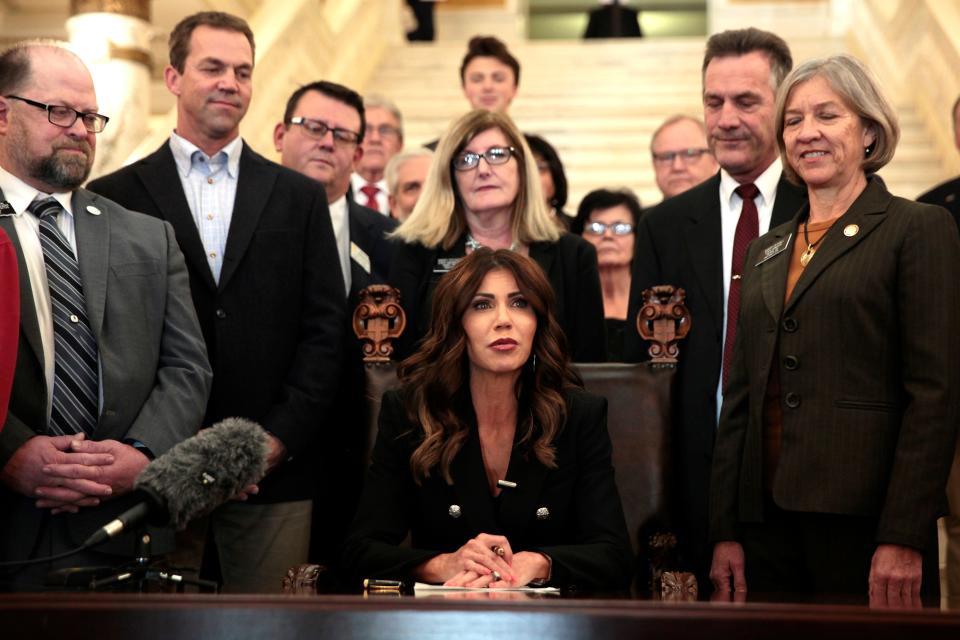
South Dakota’s first “bathroom bill,” attempting to separate students in restrooms and locker rooms based on the sex they were assigned at birth, came in 2016 in the form of Rep. Fred Deutsch’s (R-Florence) House Bill 1008, saying it took aim at federal overreach from an Obama-era administration interpretation of Title IX.
Deutsch has introduced or co-signed 13 anti-LGBTQ+ bills, among the most any one lawmaker in the state has sponsored. Asked about his view of the LGBTQ+ community and why the LGBTQ+ community continues to be a focus of his legislation, he sent the following statement:
“I will always champion legislation that protects girls from horrible scenarios like boys having unlimited access to the girl’s bathrooms and locker rooms, as well as bills that safeguard young South Dakotans from being mutilated,” Deutsch said. “Story after story shows how these reckless policies only endanger minors, causing lifelong trauma and irreversible bodily damage. What’s discriminatory and hateful is putting innocent South Dakotans in harm’s way in the name of a twisted version of what the left calls ‘love.’”
He did not answer questions on the impetus of each of his bills, or whether he agreed with the categorization of his bills as discriminatory or hateful.
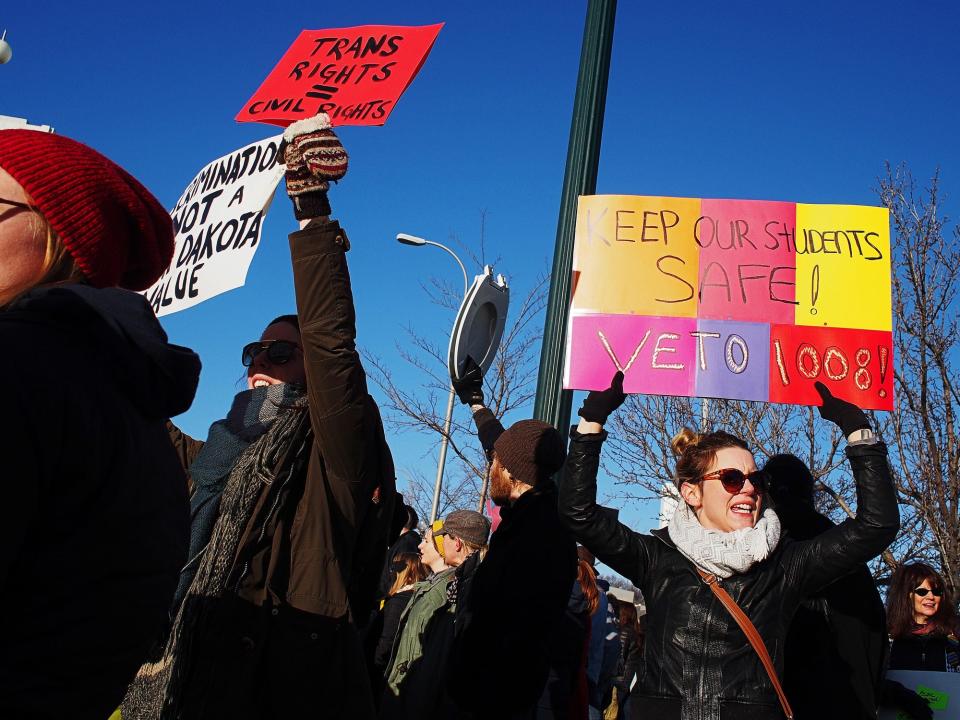
HB 1008 received national attention at the time. Daugaard eventually vetoed the bill because it didn’t “address any pressing issue concerning the school districts of South Dakota,” he said in his veto letter, adding local school districts can and have made necessary accommodations serving the best interests of all students, regardless of sex or gender.
Similar bills came up again for two consecutive years after that veto, then resurfaced with HB 1005 in 2022 after the Vermillion School District was the first in the state to adopt a policy explicitly inclusive of trans students in November 2021, allowing them to use the name, pronouns and restroom of their choice.
What other anti-LGBTQ+ bills have come up?
A number of other bills aimed at the LGBTQ+ community have failed:
Bills in 2016 and 2021 that would prevent trans people from changing their birth certificates to align with their lived gender;
A bill in 2020 that would forcibly out students with gender dysphoria to their parents;
Bills in 2018 and 2019 prohibiting education on gender identity and expression in kindergarten through seventh grade; and,
Two bills introduced this year that aimed to prevent events like a student-run drag show at South Dakota State University from ever happening again, despite events like those running at SDSU and the University of South Dakota for decades.
The most egregious bills — House Bill 1215 in 2020 and House Concurrent Resolution 6008 in 2023 — could’ve codified ideals that only straight marriage is valid and that trans people don’t exist.
For example, HB 1215 would’ve put into statute that the state couldn’t enforce, endorse or favor policies that permit marriage that wasn’t between a man and a woman, treat sexual orientation as a protected class of discrimination and recognize peoples’ transgender feelings.
Rep. Tony Randolph (R-Rapid City) would not comment on why he introduced HB 1215 or why he later withdrew it.
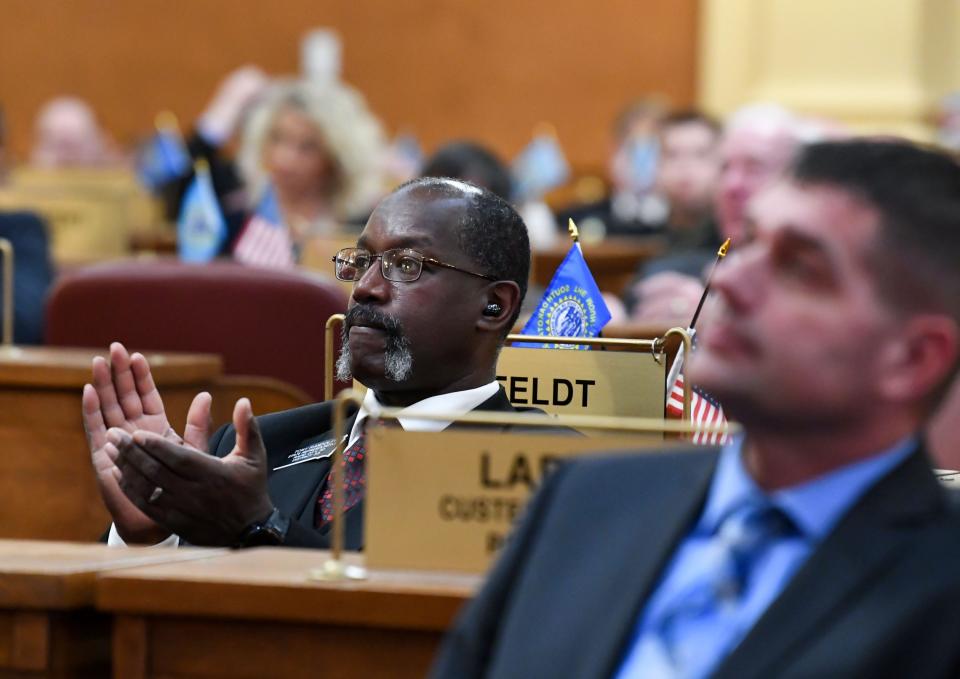
Rep. Phil Jensen (R-Rapid City) said he brought HCR 6008 to show an “affirmation of our fealty to our South Dakota values of hard work (and) individual liberty.” He intended it as a Republican party platform since there are differences of opinion within the party, he said. The resolution stated strong marriages are between one man and one woman, and one’s sex assigned at birth determines the use of restrooms, locker rooms and sports teams.
At least five bills have also come up in the Legislature between 2020 and now as resolutions celebrating the state’s estimated 25,000 LGBTQ+ people. Those never passed though, and neither did a bill in 2023 that would’ve cleared up the state’s marriage statute to verify marriage can occur between more than a man and a woman, as it stands in state law.
How have these bills impacted the LGBTQ+ community?
While some of the bills have failed over the years, the memory of discriminatory arguments lawmakers made in attempts to pass those bills still rings in the statehouse and in the memory of LGBTQ+ South Dakotans who are supposed to feel represented by those lawmakers.
Even one anti-trans bill can make a difference in the mental health of a transgender person, said Susan Williams, director of the Transformation Project. The Transformation project is a state-level nonprofit focused on supporting and empowering trans individuals and their families while educating communities in South Dakota and the surrounding region about gender identity and expression.
“When someone feels as though an entire body of government is against them and doesn’t want them in the state or wants them to not be themselves, it can affect mental health in very dramatic ways,” Williams said. “As we’ve seen in the last few years, people have gotten more brazen about their opinions and have been spewing hate (more rampantly).”
More: Arkansas ruling on gender-affirming care ban could have implications in South Dakota
The bills that have made it into law also continue to have lasting impacts on the state’s LGBTQ+ community.
On the 2017 adoption bill, SB 49, Roger Tellinghuisen, who has at times represented the Human Rights Campaign and the South Dakota Trial Lawyers Association as a lobbyist, said in his opinion, the law is discriminatory toward gay couples who might adopt children because if an adoption agency is faith-based, they could discriminate against them.
Rob Monson, director of the School Administrators of South Dakota, has lobbied against the multiple sports bills and bathroom bills seen in years prior. He said he and other educators believed SDHSAA had a good policy and thought that was enough.
“The things we deal with are never a big deal until the legislature gets together,” Monson said. “We’ve been working with these families and students for years, and no one made a big deal about it until it was a legislative issue.”
Nathan Lukkes, former general counsel for the South Dakota Board of Regents and the new executive director and CEO, along with lobbyists from the Sioux Falls School District and both the South Dakota and Sioux Falls Chambers of Commerce, lobbied against sports bill HB 1217 in 2021. It was vetoed that year, but they didn’t lobby against a similar bill, SB 46, the following year before it was signed into law.
At the time in 2021, Lukkes and others noted the conflict between the NCAA policy on the topic and the language in the bill, and uncertainty around what action the NCAA could take if the bill passed. He also pointed to the “almost certain” litigation that could follow, which would come at a significant cost to the board.
By 2022, several states had passed similar legislation with little to no response from the NCAA, Lukkes said, which diminished concerns around what consequences could result. He added the cause of action language in SB 46 in 2022 narrowed significantly from HB 1217 the year prior.
“Given the shifting landscape, improved text of the bill, and the inherent challenge in creating a welcoming, respectful and fair playing field for all athletes, the board remained neutral and looked to the lawmakers to determine what was best for South Dakota athletes,” Lukkes said.
Only one openly trans female student-athlete has participated in sports from the time the SDHSAA adopted its inclusive policy in 2014 through when it changed policy to reflect state law in 2022, SDHSAA director Dan Swartos said, adding the student participated with the skill level reflective of a typical high school female athlete.
While the change hasn’t impacted too many athletes to Lukkes’ or Swartos’ knowledge to this point, that doesn’t mean it can’t affect more students in the future.
“What we knew about sports when (SB 46) passed is that there are comparatively few trans kids in South Dakota who are actively playing, which is in no way a justification for passing these bills,” Skarin said. “Those bills are really harmful.”
Skarin said she’s heard from some youth who wanted to play sports or had a hard time navigating the policies in South Dakota.
Where does the out-of-state influence come into South Dakota?
Anti-LGBTQ+ policies and political discussions similar to those in South Dakota have been seen in other states across the U.S. that have also implemented trans medical bans for youth, some in part because of Deutsch’s multi-state campaign to push anti-trans legislation.
Deutsch has worked with a consortium of conservative anti-trans legislators in several states for years to pass these laws, including the Alliance Defending Freedom (ADF), which has been deemed a hate group by the Southern Poverty Law Center and has long been influential in South Dakota politics, especially on LGBTQ+ policy.
Deutsch didn’t answer a question from the Argus Leader about how or why he started working with legislators and groups from other states on these issues.
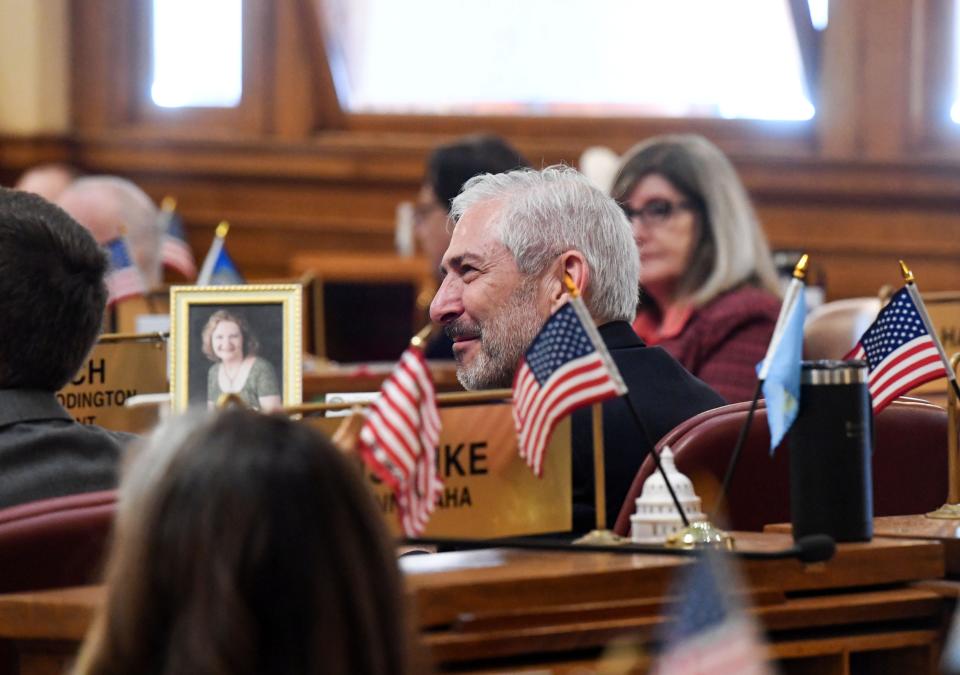
ADF supports sterilizing transgender people who seek to have their gender legally recognized. In early 2015, the group also drafted proposed legislation known as the “Student Physical Privacy Act” eerily similar to the “bathroom bill” Deutsch proposed as HB 1008.
Draft legislation from similar groups has led to a patchwork of legislation across multiple states as legislatures look to each other for advice and best practices to see what works in one place and could be applied in another.
A lobbyist from the Eagle Forum — a partner in the ADF’s “Promise to America’s Children” campaign that pushes anti-LGBTQ+ legislation and claims “school curriculum is filled with graphic information about sex, abortion and politicized ideas about sexual orientation and gender identity,” — testified in Pierre in favor of SB 66, a religious exemption bill, in 2014, and HB 1195, a sports bill, in 2015.
Michael Laidlaw, a California endocrinologist who testified in support of HB 1057 in 2020 and HB 1080 in 2023, has written against gender-affirming care and compared it to eugenics, Nazi experimentation during the Holocaust, and the Tuskegee syphilis experiment. U.S. Northern Florida District Judge Robert Hinkle has called Laidlaw a “person that’s far off from the accepted view.”
Other out-of-state influence in anti-LGBTQ+ legislation in South Dakota has been seen in testifiers from Michigan with SB 149 in 2017; from D.C., Georgia, Washington, Tennessee and Texas in HB 1057 in 2020; from Arkansas, D.C., Idaho and Minnesota in 2021 with HB 1217 and HB 1247; from Nebraska with SB 46 in 2022; and from California, D.C., Idaho and Oregon with HB 1080 this year.
Skarin said on Twitter some South Dakota legislators are already claiming they’ll introduce a “Florida-style slate of attacks on transgender children'' in the 2024 legislative session.
Deutsch has also signaled support for introducing more laws targeted at the LGBTQ+ community on Twitter, similar to ones that have passed and failed in recent years. He did not respond to an Argus Leader email asking him to specify which bills he might bring.
“These elected officials have been bullying and demeaning trans youth for nine sessions at this point,” Skarin said. “This has to stop.”
.
This article originally appeared on Sioux Falls Argus Leader: How South Dakota's anti-LGBTQ+ bills have grown in the last 10 years

